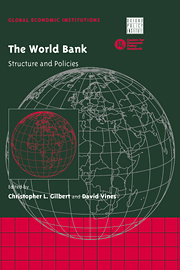Book contents
- Frontmatter
- Contents
- List of figures
- List of tables
- List of contributors
- Acknowledgements
- Introduction
- 1 The World Bank: an overview of some major issues
- Part One The World Bank's Structure: The Bank as an Institution
- Part Two The Effectiveness of World Bank Assistance
- 6 The World Bank and structural adjustment: lessons from the 1980s
- 7 The implications of foreign aid fungibility for development assistance
- 8 Aid, growth, the incentive regime and poverty reduction
- 9 How policies and institutions affect project performance: microeconomic evidence on aid, policies and investment productivity
- 10 Increasing aid effectiveness in Africa? The World Bank and sector investment programmes
- 11 The World Bank, conditionality and the Comprehensive Development Framework
- 12 Conditionality, dependence and coordination: three current debates in aid policy
- Index
12 - Conditionality, dependence and coordination: three current debates in aid policy
Published online by Cambridge University Press: 12 October 2009
- Frontmatter
- Contents
- List of figures
- List of tables
- List of contributors
- Acknowledgements
- Introduction
- 1 The World Bank: an overview of some major issues
- Part One The World Bank's Structure: The Bank as an Institution
- Part Two The Effectiveness of World Bank Assistance
- 6 The World Bank and structural adjustment: lessons from the 1980s
- 7 The implications of foreign aid fungibility for development assistance
- 8 Aid, growth, the incentive regime and poverty reduction
- 9 How policies and institutions affect project performance: microeconomic evidence on aid, policies and investment productivity
- 10 Increasing aid effectiveness in Africa? The World Bank and sector investment programmes
- 11 The World Bank, conditionality and the Comprehensive Development Framework
- 12 Conditionality, dependence and coordination: three current debates in aid policy
- Index
Summary
Introduction
In this chapter I distinguish between aid transfers and aid relationships. The traditional literature on the economics of aid focused on the resource transfer. Aid relaxed constraints on economic performance, either by increasing savings or by increasing foreign exchange. There was no relationship between donor agencies and recipient governments. Aid, in this analysis, was indistinguishable from a government-owned oil well.
I consider three aid debates in which the central issue is the relationship between the donor and the recipient. The first of these is policy-based lending, or ‘conditionally’. This relationship has been criticised both as intrusive and ineffective (although these two criticisms sit together uncomfortably). The second debate is on ‘aid dependency’. This criticism is that the aid relationship is intrinsically undermining of national capacities, analogous to the weakening of household capacities in the syndrome of welfare dependency. The third debate is around the suggestion that aid is missing an opportunity for a coordinating relationship. By focusing upon individual nations aid has, it is argued, missed its comparative advantage in the financing of coordinated development at the supra-national level, such as region-wide transport systems.
I discuss these three debates in turn.
Policy conditionally
Although policy conditionality became established only during the 1980s, the idea that international public resources should be used to induce policy reform has a long history. Its origin lies in Fund crisis programmes. For example, in one of the largest IMF programmes ever undertaken, in 1976, the British government was provided with finance on condition that it changed economic policies.
- Type
- Chapter
- Information
- The World BankStructure and Policies, pp. 299 - 324Publisher: Cambridge University PressPrint publication year: 2000
- 8
- Cited by



